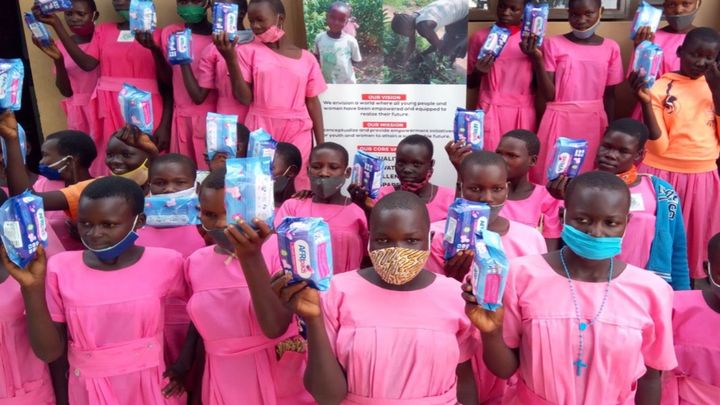
Be the Change: Inspire girls in Africa, Uganda.

Problem
The COVID-19 pandemic and the resulting economic recession have negatively affected young people’s health. A number of pandemic-related consequences, such as closures of schools, universities and loss of income have contributed to poor mental health and high rise in sexual and reproductive health concerns among the youth. This has led to an increase in cases of teenage pregnancies, early marriages, depression, anxiety, crime and hopelessness among young people. After the reopening of schools in Uganda, high cases of dropouts were reported; especially among girls in rural areas. This is attributed to high cases of teenage pregnancies and early marriages recorded during the lockdown. High rise in teenage pregnancies was caused by lack of sexual and reproductive health information, access to convenient counselling services and reliable menstrual products for teenage girls. Cultural norms, poverty and gender inequality are also the biggest culprits of high rise in teenage pregnancies and child marriages. Millions of impoverished girls face days with no access to safe menstrual health solutions. Girls turn to unsanitary methods including leaves, newspapers, and old clothes and in some cases allow themselves to be exploited out of desperation for supplies. According to several studies, the provision of safe menstrual health solutions directly decreases dropout rates for girls that have reached the age of menstruation.
How we identified the problem
IYFD has been working with a number of schools in rural Uganda (Eastern Region) under the sexual and reproductive health program. After the reopening of schools by the government of Uganda, IYFD continued its sex education sessions and distribution of reusable sanitary pads to young girls in rural schools in Kumi District. The biggest challenges that were pointed out by girls during the sessions included: lack of information on sexual and reproductive health and lack of access to menstrual hygiene products especially sanitary pads. Girls also reported to be fearing to open up to their parents and elders when they are being harassed and abused by men. This is because talking about sexuality is seen as shameful by many parents and child marriages and teenage pregnancies have been normalized by many communities in eastern Uganda. Most families are too poor to afford sanitary pads, leaving girls to use dirty clothes or engage in sexual activities to raise money for them. Our school outreach volunteers received numerous phone calls during lockdown from girls seeking support in form of pads and counselling services.
The solution
IYFD has opened an integrated community-based youth service hub (ICBYSH) targeting SRH innovations in Uganda. The hub will be a center for production of a special menstrual kit consisting of a back bag, reusable pads, a calendar and illustrated poster with SRH information. The kit will be made by the out-of-school victims of teenage pregnancies who will be trained in tailoring and packaging. The target is to produce and distribute 1,200 menstrual kits per month to the most vulnerable young girls in the local communities. Girls and boys will also receive comprehensive sex education. Clan leaders, community elders and parents will be sensitized through a series of radio talk shows to be champions of girl child protection and empowerment by breaking cultural beliefs that marginalize girls. The hub will also be a center for a mentorship and sexual and productive health innovation program where young people with solutions or ideas responding to sexual and reproductive health needs will be supported to develop and/or accelerate their innovations into products.
Why is this work so important for your community?
Gender inequality remains a huge problem in rural communities of Uganda where cultural beliefs are entrenched. Girls continue to be marginalized and the majority of them drop out of school because of teenage pregnancies or forced marriages before the age of eighteen years. This work will break the barriers of gender inequality and girls will be empowered to attain quality education just as their counterparts do. An educated girl child will break poverty cycles in families, boost the economic market, improve living conditions, be healthier and live longer. Victims of teenage pregnancies and child marriages will earn stipends for making menstrual kits and this will empower them economically and will be able to take care of their children. Your donations will keep girls in school, empower victims of teenage pregnancies hence bringing dignity and hope to the young girls.
What will your donations do?
$50 will help us to buy cotton materials to make 100 reusable sanitary pads that girls can depend on for 2 years.
$100 buys moisture barrier fabric to make 600 reusable sanitary towels.
$80 can buy materials to make 20 back bags.
$40 can buy underwear for 60 girls.
$180 will buy one electric sewing machine for the hub.
$500 will help in carrying out 3 radio talk shows.
$1000 will help to equip the youth hub.






